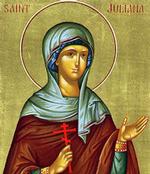Fathers of the Church
Letter CXXIII: to Eudocia Augusta, about the Monks of Palestine
by Leo the Great in 453 | translated by Charles Lett Feltoe, M.A
Leo, the bishop, to Eudocia Augusta.
I. A request that she should use her influence with the monks of Palestine in reducing them to order.
I do not doubt that your piety is aware how great is my devotion to the catholic Faith, and with what care I am bound, GOD helping me, to guard against the Gospel of truth being withstood at any time by ignorant or disloyal men. And, therefore, after expressing to you my dutiful greetings which your clemency is ever bound to receive at my hands, I entreat the LORD to gladden me with the news of your safety, and to bring aid evermore and more by your means to the maintenance of that article of the Faith over which the minds of certain monks within the province of Palestine have been much disturbed; so that to the best of your pious zeal all confidence in such heretical perversity may be destroyed. For what but sheer destruction was to be feared by men who were not moved either by the principles of GOD's mysteries, or by the authority of the Scriptures, or by the evidence of the sacred places themselves. May it advantage then the Churches, as by GOD'S favour it does advantage them, and may it advantage the human race itself which the Word of GOD adopted at the Incarnation, that you have conceived the wish to take up your abode in that country where the proofs of His wondrous acts and the signs of His sufferings speak to you of our Loan Jesus Christ as not only true GOD but also true Man.
II. They are to be told that the catholic Faith rejects both the Eutychian and the Nestorian extremes. He wishes to be informed how far she succeeds.
If then the aforesaid revere and love the name of "catholic," and wish to be numbered among the members of the LORD'S body, let them reject the crooked errors which in their rashness they have committed, and let them show penitence for their wicked blasphemies and deeds of bloodshed. For the salvation of their souls let them yield to the synodal decrees which have been confirmed in the city of Choicedon. And because nothing but true faith and quiet humility attains to the understanding of the mystery of man's salvation, let them believe what they read in the Gospel, what they confess in the Creed, and not mix themselves up with unsound doctrines. For as the catholic Faith condemns Nestorius, who dared to maintain two persons in our one LORD Jesus Christ, so does it also condemn Eutyches and Dioscorus who deny that the true human flesh was assumed in the Virgin Mother's womb by the only-begotten Word of GOD.
If your exhortations have any success in convincing these persons, which will win for you eternal glory, I beseech your clemency to inform me of it by letter; that I may have the joy of knowing that you have reaped the fruit of your good work, and that they through the LORD'S mercy have not perished. Dated the 15th of June, in the consulship of the illustrious Opilio .
Taken from "The Early Church Fathers and Other Works" originally published by Wm. B. Eerdmans Pub. Co. in English in Edinburgh, Scotland, beginning in 1867. (LNPF II/XII, Schaff and Wace). The digital version is by The Electronic Bible Society, P.O. Box 701356, Dallas, TX 75370, 214-407-WORD.



